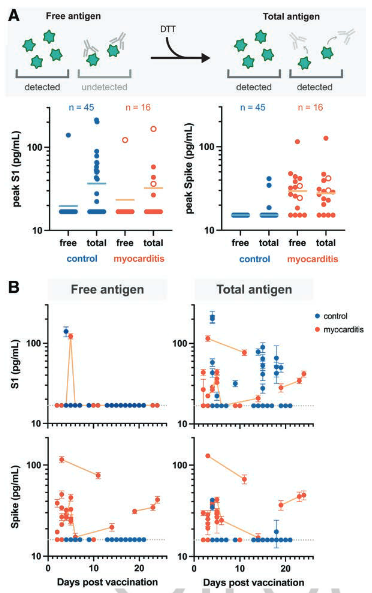
Fact-checkers and Big Tech lost another round with purported COVID-19 misinformation this week, when an American Heart Association journal published research suggesting the spike protein used in mRNA vaccines can harm some people.
The peer-reviewed study in Circulation reviewed 16 adolescents and young adults hospitalized at Massachusetts General Hospital or Boston Children’s with post-vaccination myocarditis from January 2021-February 2022. All had “markedly elevated levels of full-length spike protein” in their blood, “unbounded by antibodies.”
The Harvard Medical School researchers affiliated with the hospitals did not find free-floating spike in 45 “healthy, asymptomatic, age-matched vaccinated control subjects,” despite “essentially indistinguishable” antibody profiling and T-cell responses between the two groups.
The findings call into doubt the default response of tech platforms and media organizations when dissenting scientists question the safety of the spike protein.
LinkedIn abruptly shut down mRNA vaccine pioneer-turned-critic Robert Malone’s premium account in June 2021 when he mentioned the spike in the context of heart inflammation reports among young men. Malone later said a LinkedIn “senior executive” personally apologized for the wrongful removal.
Reuters and PolitiFact have each fact-checked Malone for claiming the spike is “cytotoxic” and harms children. “The spike proteins are harmless, do not cause illness and do not last long in the body,” PolitiFact claimed a year ago.
“Covid vaccines show your body’s natural defenses how to recognize and kill the virus, then they disappear,” former CDC Director Tom Frieden claimed in October 2021. “They don’t stay with you.”
Last summer, Twitter issued a strike against Kevin McKernan, who managed MIT’s research and development for the Human Genome Project, for claiming the spike protein is a “super-antigen” whose staphylococcal enterotoxin B domain has “potent toxicity.”
More than a year ago, Swedish researchers reported in the peer-reviewed journal Viruses that SARS-CoV-2’s spike protein “significantly inhibits DNA damage repair,” so it might be “safer and more efficacious” to phase out the full-length spike in COVID vaccine development.
The Circulation study has been shared by COVID vaccine skeptics, including British cardiologist Aseem Malhotra, who told Just the News last fall he first faced social media censorship after turning on mRNA products. Malhotra now calls them “one of the worst pharmaceutical interventions in the history of medicine.”

